
Pyotr Ilyich Tchaikovsky was a Russian composer of the Romantic period. He was the first Russian composer whose music would make a lasting impression internationally. He was honored in 1884 by Tsar Alexander III and awarded a lifetime pension.
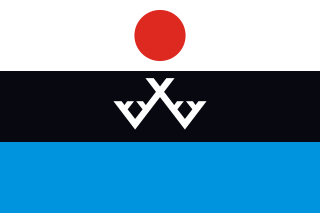
The Evenks are a Tungusic people of North Asia. In Russia, the Evenks are recognised as one of the indigenous peoples of the Russian North, with a population of 38,396. In China, the Evenki form one of the 56 ethnic groups officially recognised by the People's Republic of China, with a population of 30,875. There are 537 Evenks in Mongolia, called Khamnigan in the Mongolian language.

Modest Petrovich Mussorgsky was a Russian composer, one of the group known as "The Five". He was an innovator of Russian music in the Romantic period. He strove to achieve a uniquely Russian musical identity, often in deliberate defiance of the established conventions of Western music.
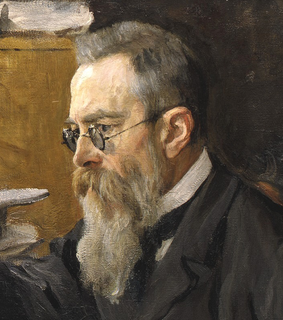
Nikolai Andreyevich Rimsky-Korsakov was a Russian composer, and a member of the group of composers known as The Five. He was a master of orchestration. His best-known orchestral compositions—Capriccio Espagnol, the Russian Easter Festival Overture, and the symphonic suite Scheherazade—are staples of the classical music repertoire, along with suites and excerpts from some of his 15 operas. Scheherazade is an example of his frequent use of fairy-tale and folk subjects.
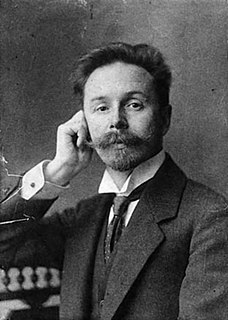
Alexander Nikolayevich Scriabin was a Russian composer and pianist. In his early years he was greatly influenced by the music of Frédéric Chopin, and wrote works in a relatively tonal, late Romantic idiom. Later, and independently of his highly influential contemporary, Arnold Schoenberg, Scriabin developed a substantially atonal and much more dissonant musical language, which accorded with his personal brand of metaphysics. Scriabin was influenced by synesthesia, and associated colours with the various harmonic tones of his atonal scale, while his colour-coded circle of fifths was also influenced by theosophy. He is considered by some to be the main Russian Symbolist composer.

The N. A. Rimsky-Korsakov Saint Petersburg State Conservatory, also known as the Leningrad Conservatory, is a school of music in Saint Petersburg, Russia. In 2004, the conservatory had around 275 faculty members and 1,400 students.
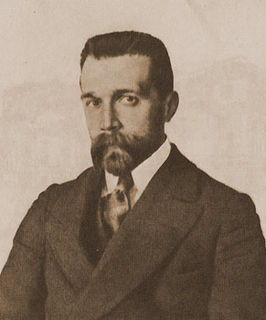
Nikolai Yakovlevich Myaskovsky or Miaskovsky or Miaskowsky, was a Russian and Soviet composer. He is sometimes referred to as the "Father of the Soviet Symphony". Myaskovsky was awarded the Stalin Prize five times, more than any other composer.
Nikolai Girshevich Kapustin was a Soviet and Russian composer and pianist. He played with early Soviet jazz bands such as the Oleg Lundstrem Orchestra. In his compositions, mostly for piano, he used a fusion of jazz and classical forms. He and other pianists recorded his works.
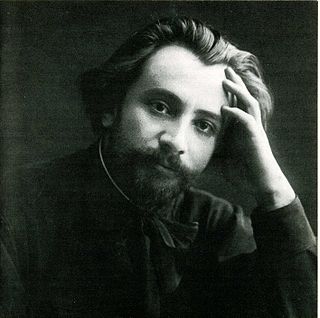
Nikolai Andreevich Roslavets was a significant Russian and Ukrainian modernist composer of Belorussian and Ukrainian origin. Roslavets was a convinced modernist and cosmopolitan thinker, his music was officially suppressed from 1930 onwards.

Mother is a 1926 Soviet drama film directed by Vsevolod Pudovkin. It depicts the radicalization of a mother, during the Russian Revolution of 1905, after her husband is killed and her son is imprisoned. The film is based on the 1906 novel The Mother by Maxim Gorky. It is the first film in Pudovkin's "revolutionary trilogy", alongside The End of St. Petersburg (1927) and Storm Over Asia (1928).
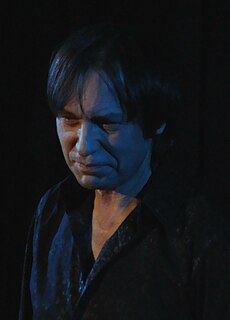
Nikolai Ivanovich Noskov is a Russian singer and former vocalist of the hard rock band Gorky Park. Five-time winner of the Golden Gramophone. He was also a member of Москва (Moscow) ensemble in the early 1980s, in band Гран-при in 1988, just before joining Gorky Park, and much later in the 1990s in band Николай (Nikolai). Starting 1998, Noskov had a solo career releasing six solo albums. In 2015, he was jury in second season of reality TV series Glavnaya Stsena.

Tungusic peoples are an ethno-linguistic group formed by the speakers of Tungusic languages. They are native to Siberia and Northeast Asia.

Pyotr Ilyich Tchaikovsky's Piano Concerto No. 2 in G major, Op. 44, was written in 1879–1880 and dedicated to Nikolai Rubinstein, who had insisted he be allowed to perform it at the premiere as a way of making up for his harsh criticism of Tchaikovsky's First Piano Concerto. But Rubinstein was destined never to play it, as he died in March 1881, and the work has never attained much popularity.

Nikolai Alexeyevich Titov was a Russian composer, violinist, and Major General in various regiments during the 19th century. He is considered to be the "Grandfather of the Russian Romance." His compositional style was considered to be in the pre-classical orientation, thus setting the groundwork for the developments by Glinka and his contemporaries.

Sergei Nikolaevich Alphéraky (1850–1918) was a Russian ornithologist and entomologist who specialised in Lepidoptera.

Nikolai Nikolaevich Baskakov was a Soviet, later Russian, painter, a member of the Saint Petersburg Union of Artists, who lived and worked in Leningrad, regarded as one of the leading representatives of the Leningrad school of painting, most famous for his genre and portrait painting.

Yessey is a rural locality in Evenkiysky District of Krasnoyarsk Krai, Russia, located on the shore of Lake Yessey.

Dmitry Borisovich Kabalevsky was a Soviet composer and teacher of Russian gentry descent.

Nikolai Alekseevich Stravinsky is a Russian musician, composer, and multi-instrumentalist. Among other projects, he is known for performing under the name Selfieman. Previously, he played guitar with the punk band Тараканы! (Cockroaches), drums with punk supergroup Ракеты из России, as well as singing and playing guitar with the band Фея Драже.
Nikolai Nikolayevich Andreyev was a Russian physicist who specialized in the study of music and acoustics. The Andreyev Acoustics Institute and a research vessel Akademik Nikolai Andreyev are named after him.


















